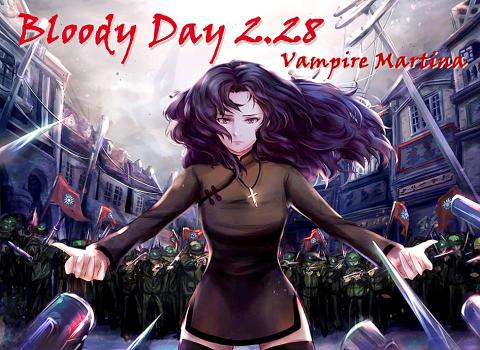A team led by pro-Taiwan independence author Shih Te-lang (施特朗) has finished work on a video game that retells the history of the 228 Massacre from the perspective of a vampire.
The 228 Massacre refers to a crackdown launched by the then-Chinese Nationalist Party (KMT) regime against civilian demonstrators following an incident in Taipei on Feb. 27, 1947. The event also marked the beginning of the White Terror era that saw thousands of people arrested, imprisoned or executed.
The game, titled Bloody Day 2.28: Vampire Martina (荷裔台籍吸血鬼), tells the story of pro-independence fighter and vampire Martina’s war against the KMT soldiers who arrived in Taiwan following their defeat in the Chinese Civil War.

Photo courtesy of Shih Te-lang
Shih, 40, who had worked on the game for two years with a team of university students, said he was surprised when the demo version of the game he released showed up on Chinese servers on Oct. 12.
“I was quite puzzled. I mean, it’s a game promoting Taiwanese independence,” he said.
However, the following day he noticed the game had been taken down from the Chinese servers, presumably by Chinese censors.
“I guess that’s one way of preventing piracy,” he said.
A history buff who loves vampire stories, Shih said he hoped that by combining the two, he might inspire others to create works with a Taiwanese element.
The protagonist of the new game is from a novel he wrote seven years ago, which was published three years ago, he said.
In the novel, Martina is a Dutch woman who became a vampire and came to Taiwan — then referred to as “Formosa” — during the Dutch colonial period.
“I came to realize that people tend to see the 228 Incident from the perspective of the victims,” he said.
Always framing the Incident as one of death and tragedy would not help society advance, he said, adding that it was more helpful to put the resistance fighters at the heart of the discourse.
Many people are unfamiliar with key figures of the White Terror era’s resistance movement — including Chen Tsuan-ti (陳篡地) and Liu Chan-hsien (劉占顯) — both of whom the KMT regime characterized as rioters, he said.
“I decided to tell the story of Taiwan’s 400 years of resistance through a video game,” he said.
The game also contains satirical elements, such as if players shoot a Republic of China flag, it drops pig’s blood cake or an Easter egg covered in blood, he said.
The game does carry a political message, such as the identity conflict that protagonist Martina experiences, he said.
“After several hundred years in Taiwan she sees herself as Taiwanese, and finds herself embroiled in a conflict of historical perspectives when faced with the KMT and its imposition of a national identity,” he said.
The full version of Bloody Day 2.28: Vampire Martina is to be released on software-distribution service Steam on Jan. 11 and costs NT$228, he said.

Japanese footwear brand Onitsuka Tiger today issued a public apology and said it has suspended an employee amid allegations that the staff member discriminated against a Vietnamese customer at its Taipei 101 store. Posting on the social media platform Threads yesterday, a user said that an employee at the store said that “those shoes are very expensive” when her friend, who is a migrant worker from Vietnam, asked for assistance. The employee then ignored her until she asked again, to which she replied: "We don't have a size 37." The post had amassed nearly 26,000 likes and 916 comments as of this

US President Donald Trump said "it’s up to" Chinese President Xi Jinping (習近平) what China does on Taiwan, but that he would be "very unhappy" with a change in the "status quo," the New York Times said in an interview published yesterday. Xi "considers it to be a part of China, and that’s up to him what he’s going to be doing," Trump told the newspaper on Wednesday. "But I’ve expressed to him that I would be very unhappy if he did that, and I don’t think he’ll do that," he added. "I hope he doesn’t do that." Trump made the comments in

Tourism in Kenting fell to a historic low for the second consecutive year last year, impacting hotels and other local businesses that rely on a steady stream of domestic tourists, the latest data showed. A total of 2.139 million tourists visited Kenting last year, down slightly from 2.14 million in 2024, the data showed. The number of tourists who visited the national park on the Hengchun Peninsula peaked in 2015 at 8.37 million people. That number has been below 2.2 million for two years, although there was a spike in October last year due to multiple long weekends. The occupancy rate for hotels

A cold surge advisory was today issued for 18 cities and counties across Taiwan, with temperatures of below 10°C forecast during the day and into tonight, the Central Weather Administration (CWA) said. New Taipei City, Taipei, Taoyuan and Hsinchu, Miaoli and Yilan counties are expected to experience sustained temperatures of 10°C or lower, the CWA said. Temperatures are likely to temporarily drop below 10°C in most other areas, except Taitung, Pingtung, Penghu and Lienchiang (Matsu) counties, CWA data showed. The cold weather is being caused by a strong continental cold air mass, combined with radiative cooling, a process in which heat escapes from